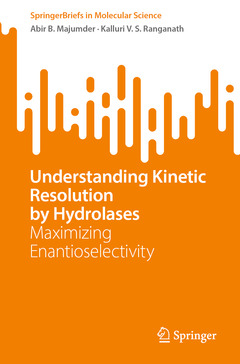Understanding Kinetic Resolution by Hydrolases, 1st ed. 2023 Maximizing Enantioselectivity SpringerBriefs in Molecular Science Series
Auteurs : Majumder Abir B., Ranganath Kalluri V. S.

This brief is a concise guide that explores the theory and practical aspects of improving enantioselectivity in enzymatic kinetic resolution, with a specific focus on the role of hydrolases in this process. Enzymatic kinetic resolution is a valuable technique for obtaining enantiopure compounds, and hydrolases are highlighted as a crucial class of enzymes widely used in industries for chiral synthesis involving kinetic resolution. The book emphasizes the importance of tuning and optimizing the enzymatic kinetic resolution process to achieve the highest possible enantiomeric excess in the final product or starting material while maintaining the desired yield. Through illustrative examples, the text aims to make the concept accessible and appealing to graduate students, researchers, and young organic chemists seeking to incorporate hydrolases in their stereoselective synthesis endeavors.
Understanding Enzymatic Kinetic Resolution.- Essential Parameters: Determination and Significance - Enantioselectivity: The Decisive Factors.- Dynamic Kinetic Resolution.
Dr. Abir Baran Majumder was born in India in 1977 and completed M.Sc. in Organic Chemistry in 2001 from the University of North Bengal, earning a University Graduation Gold Medal and a Certificate of Distinction as an Organic Chemist. He was awarded CSIR Junior Research Fellowship and CSIR Senior Research Fellowship during his doctoral research. His Ph.D. studies ended in 2010 under the guidance of Professor Munishwar Nath Gupta at the Indian Institute of Technology Delhi in the field of stereoselective biocatalysis. He then worked as a DST Project Scientist in the same institute and then joined Rajiv Gandhi University of Knowledge Technologies, Hyderabad, as a full-time Lecturer of Chemistry in Basar. During this period, he teamed up with the Indian Institute of Technology, Delhi and concentrated his research on the application of the promiscuous behavior of enzymes to synthesize exquisite molecules which were otherwise difficult to prepare. Apart from promiscuous biocatalysis his research was focused on extraction of algal oil from spirogyra using proteases, a project funded by the institute. From 2015 onwards he has been working as an Assistant Professor and Head of the Chemistry Department in KGT Mahavidyalaya, University of North Bengal. He is presently working in collaboration with the Department of Chemistry, Institute of Science, Banaras Hindu University and with industries including Peak Biotech, Siliguri and Scrips Pharma, Hyderabad. His current areas of research interest are: Stereoselective biocatalysis, Green chemistry, Nanobiocatalysis, Bioorthogonal reactions.
Prof. Kalluri Venkata Sri Ranganath was born in 1976 and completed M.Sc in Physical Chemistry in 1998 from the Sri Venkateswara University, Tirupati. He joined for his Ph. D. studies under the guidance of Prof. B.M. Choudary at Indian Institute of Chemical Technology Hyderabad in the field of heterogeneous (asymmetric) catalysis and completed in 2005. Later he moved
Discusses the role of hydrolases in improving enantioselectivity
Emphases on the industrial relevance of enzymatic kinetic resolution
Includes illustrative examples
Date de parution : 01-2024
Ouvrage de 45 p.
15.5x23.5 cm



